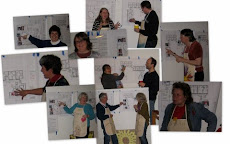
Raising a Family in Cohousing, Part 1
By Tiffany Yelton Bram
Cohousing is often touted as ideal for families. As a mom in a developing community, I thought it would be good to capture how cohousing shapes our family and how family shapes this community.
Let's begin at the beginning. My name is Tiffany and I moved to Portland, Oregon, at the start of 2006. I lived in Seattle and my husband-to-be lived in Portland. Since my family lives in Oregon and my husband loves Portland like a friend, I made the move here.
The first thing we did was to find a nice place to rent to give us time to think about how and where we wanted to live. Alex, my hubby, had been following a listserv about cohousing in Portland and he told me what he knew about it. Intrigued, I agreed to go to some of the meetings that different forming groups announced on the listserv. I went to a cohousing social on my own and met the folks starting Daybreak Cohousing (then Sunrise Cohousing). I told Alex that he had to meet them too.
I trust my instincts about people. My feelings about the Daybreak folks were immediately positive. I could see the dream they shared but, more importantly for me, I could see the plan they described and felt that they knew how to put that plan in action. We asked to join them.
Alex and I jumped into our new cohousing adventure. Soon we developed friendships with our cohousing group. We not only worked together on the project but we ate together, went to plays, white water rafting, camping and picnicing together.
Time passed and Alex and I talked about our future family. We are a bit older (in our 40s) and planned to adopt a child. But wonderful surprises happen and in December 2007, we found out we were pregnant. I was so happy and so scared. So we waited until we got through the first trimester and then shared the news with our cohousing community. The happiness shared with us was amazing.
And here is where the magic of developing these relationships struck me. The women of the community wanted to celebrate our pregnancy with a blessing way. I wasn't sure what this was and I was uncomfortable being the focus of attention. But I was so touched that they wanted to do this for me that I said “yes” and accepted the gift of the celebration. The day of the party was lovely. We gathered at one home and ate, shared stories of being children, of having children and memories of our mothers. Then I did something I hadn't done before. I shared all of my fears. About the health of the baby, the delivery, my ability to be a mom, the loss of my own Mom three years before. And my friends held all of that fear for me, held me and let me know that they understood. I got a lot stronger after that. Sharing this big life change with people who will be close to us in our life as family helped me build bonds I hadn't even known that I needed.
Now fast forward a bit: our son, Max, was born in August, 2008. He is terrific. Before every meeting, I tell him that we are going to go see our Daybreak friends. He often kicks his feet upon hearing this—one of his happy movements.
In future blog posts I'll write about our developing family, what we want for our life as afamily in cohousing and what enfolds.
By Tiffany Yelton Bram









